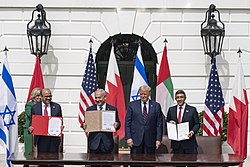
Back اتفاقيات إبراهيم Arabic اتفاقيات ابراهيم ARZ Avraam müqavilələri Azerbaijani আব্রাহাম চুক্তি Bengali/Bangla Abrahámovské dohody Czech Abraham-aftalerne Danish Abraham Accords Declaration German Abraham-Akordoj Esperanto Abraham akordioak Basque پیمان ابراهیم Persian
 Representatives (left-to-right):
| |
| Type | Normalization treaty |
|---|---|
| Context | Arab–Israeli conflict |
| Signed | September 15, 2020 |
| Location | Washington, D.C., United States |
| Negotiators | |
| Signatories | Subsequent signatories: |
| Languages |
|
| ||
|---|---|---|
|
Business and personal 45th and 47th President of the United States Tenure
Impeachments Legal proceedings  |
||
The Abraham Accords are a set of agreements that established diplomatic normalization between Israel and several Arab states, beginning with the United Arab Emirates and Bahrain.[1][2] Announced in August and September 2020 and signed in Washington, D.C. on September 15, 2020, the accords were mediated by the United States under President Donald Trump.[3] The UAE and Bahrain became the first Arab countries to formally recognize Israel since Jordan in 1994.[4] In the months that followed, Sudan and Morocco also agreed to normalize relations with Israel, although Sudan's agreement remains unratified as of 2024.[5]
The accords emerged against the backdrop of growing unofficial cooperation between Israel and Sunni Arab states throughout the 2010s, driven by shared concerns about Iran. Efforts to build ties had become increasingly public by 2018, with visits by Israeli officials to Gulf states and the start of limited military and intelligence cooperation. In mid-2020, a normalization deal between Israel and the UAE was brokered in exchange for the suspension of Israeli plans to annex parts of the West Bank, as proposed in the Trump peace plan.[6]
The agreements formalized economic, diplomatic, and security cooperation. In Morocco's case, normalization came with U.S. recognition of Moroccan sovereignty over Western Sahara.[7] For Sudan, it included removal from the U.S. list of state sponsors of terrorism and access to international financial support.[8] The accords were presented in elaborate ceremonies and widely promoted by the Trump administration as a major diplomatic achievement.[9][10]
Reactions in the Arab world were mixed. While governments expressed support, public opinion in many countries remained opposed, particularly due to the accords' lack of progress on resolving the Israeli–Palestinian conflict. Despite this, the accords led to new initiatives in trade, defense, energy, technology, and cultural exchange. The name "Abraham Accords" was chosen to reflect the shared heritage of the Abrahamic religions—Judaism and Islam.[11][12]
- ^ "Moroccan Foreign Minister Bourita Says Abraham Accords Provide "Incredible Momentum" for Peace in Middle East | AJC". www.ajc.org. June 12, 2023.
- ^ Federico-O'Murchú, Seán (August 13, 2020). "Read the full statement by the US, Israel and UAE on normalizing Israel-UAE relations". CNN. Archived from the original on November 15, 2020. Retrieved September 15, 2020.
- ^ "The Abraham Accords". U.S. Department of States. Archived from the original on October 22, 2020. Retrieved September 21, 2020.
- ^ "Israel, UAE and Bahrain sign Abraham Accord; Trump says "dawn of new Middle East"". The Hindu. Press Trust of India. September 16, 2020. Archived from the original on September 19, 2020. Retrieved September 21, 2020.
- ^ Cite error: The named reference
threatenwas invoked but never defined (see the help page). - ^ Cite error: The named reference
:0was invoked but never defined (see the help page). - ^ Kelemen, Michele (December 10, 2020). "Morocco Agrees To Join Trump Administration's Abraham Accords". NPR. Retrieved November 21, 2022.
- ^ Lawder, David (January 7, 2021). Ellis, Aurora (ed.). "U.S. Treasury signs loan deal to clear Sudan's $1.2 billion World Bank arrears". Reuters.
- ^ Cite error: The named reference
:2was invoked but never defined (see the help page). - ^ Riechmann, Deb; Lee, Matthew; Lemire, Jonathan (September 15, 2020). "Israel signs pacts with 2 Arab states: A 'new' Mideast?". Washington Post. Retrieved January 31, 2024.
- ^ Meuse, Alison Tahmizian (September 16, 2020). "Israel inks twin Arab treaties with UAE, Bahrain". Asia Times. Archived from the original on October 23, 2020. Retrieved January 31, 2024.
- ^ "The Abraham Accords Declaration". State.gov. U.S. State Department. September 15, 2020. Archived from the original on September 20, 2020. Retrieved September 4, 2022.
© MMXXIII Rich X Search. We shall prevail. All rights reserved. Rich X Search

